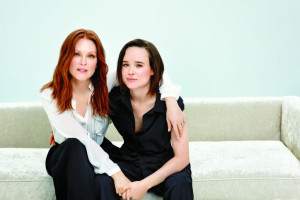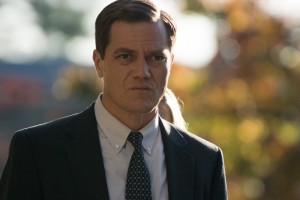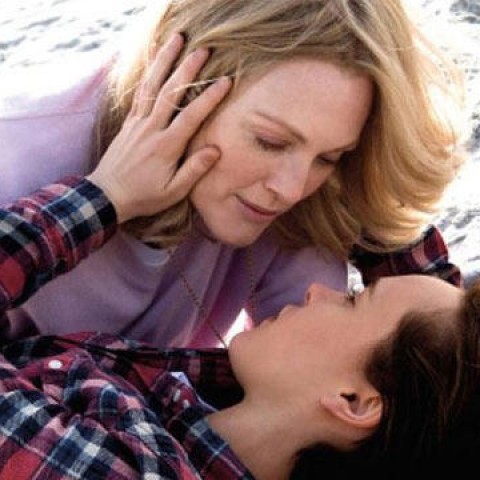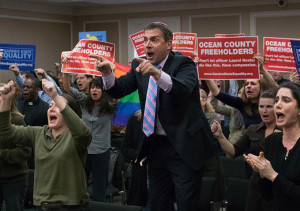Andrew Rostan was a film student before he realized that making comics was his horrible destiny, and he’s never shaken his love of cinema. Every week, he’ll opine on current pictures or important movies from the past.
Carrie Nelson warned me about Freeheld.
Carrie and I have been friends since we attended Emerson College together, and among many things she is a terrific documentary filmmaker who is steeped in the language and lore of cinema. I say “among many things” because she is also a regular contributor to The Daily Dot and an outspoken voice on LGBTQ and feminist issues. She has taught me a great deal, and thus when she revealed she had seen Freeheld I eagerly asked her opinion on this early Oscar contender.
She looked at me with a grimace.
“It is such a bad film. I wanted to like it so much…but all the dialogue is pretty awful. Very literal and expository.”
I have now seen Freeheld…and it is even worse than that.
A Film Without Subtext
The tragic yet uplifting love story of Laurel Hester and Stacie Andree was one made for the Hollywood treatment. When production began on Freeheld it was a perfect pro-gay marriage film, and in the wake of the Supreme Court’s decision, the central thrust of why marriage equality—and equality in general—matters in our society remained potent. This was a terrific theme for a movie.
Unfortunately, screenwriter Ron Nyswaner, who two decades ago wrote the genuinely poignant Philadelphia, now mystifyingly combines two of the most dangerous instincts of filmmakers who want to put a message in their movies. Nyswaner’s role models are Stanley Kramer, the all-time champion of middlebrow liberal movies that suggested to middlebrow audiences that hey, maybe racism is bad, and maybe grand-scale war is suicidal, and maybe we don’t need to believe everything with which society, especially religion, indoctrinates us (Actually, Inherit the Wind is ripe for revival in 2016.) and Paul Haggis, who cruised to a Best Picture by banging the same point home for two hours without a break. In Freeheld, every character says exactly what they think and feel with nothing left to interpretation so we the audience get the point. The conflict is almost cartoonishly one-sided; the film both works hard to present Laurel and Stacie as a loving partnership like any other married couple (They go dancing! They buy a house and remodel it! They have sweet but very non-explicit sex!) and as two courageous near-saints in a world full of oppressors, cowards, and people who just don’t understand yet. It’s a cloying portrait not helped by Peter Sollett, who shares with Kramer and Haggis a boring directorial lack of style.
This is bad enough for the central thrust of the dying Laurel fighting to give Stacie her pension, but that takes up only the second half of Freeheld. The first half is a wide variety of scenes that play just as terribly. To show how terrific Laurel and Stacie are at their jobs, the film gives us third-rate, tension-free cop-show outtakes and a scene of Stacie fixing cars that lasts FOREVER. All the dialogue in Laurel and Stacie’s first date sounds like it was written by lovestruck high school students. Then there’s the scene in which Laurel’s partner and best friend Dane drives by the new home and meets Stacie for the first time. This scene is necessary for all the three leads to face their personal dramas before Laurel’s cancer diagnosis unites them…and it crams enough plot and emotion to fill five entire scenes. The scene also includes the line that gives this review its title, which Dane yells almost apropos of nothing and is never referenced again. It makes one wonder if Tommy Wiseau had the reins that day.
Great Actors Doing Their Best
 A screenplay like Freeheld is enough to take down any actor, which is sad because the cast is full of people I (and I think most of our readers) love watching. Julianne Moore (who gets to protractedly, nobly suffer again as she did in the superior Oscar-winning Still Alice last year) and Ellen Page (who co-produced the movie) are two intelligent actresses with great chemistry—which comes across best in the scenes where they do not have to talk as much. Part of the dynamic between them is that Laurel is older, more experienced, and naturally wiser than Stacie, and in a screenplay full of people stating the obvious, Stacie comes across in some scenes as an almost stupid figure, an insult to both Page and the real Ms. Andree. Laurel gets off no easier; Moore has a big scene in which she talks about coming out, her struggle, and the ultimate freedom she found. There are many ways to deliver this message: the film has Moore tell the story to a witness in a murder case as a tactic to win a confession, which cheapens the whole thing.
A screenplay like Freeheld is enough to take down any actor, which is sad because the cast is full of people I (and I think most of our readers) love watching. Julianne Moore (who gets to protractedly, nobly suffer again as she did in the superior Oscar-winning Still Alice last year) and Ellen Page (who co-produced the movie) are two intelligent actresses with great chemistry—which comes across best in the scenes where they do not have to talk as much. Part of the dynamic between them is that Laurel is older, more experienced, and naturally wiser than Stacie, and in a screenplay full of people stating the obvious, Stacie comes across in some scenes as an almost stupid figure, an insult to both Page and the real Ms. Andree. Laurel gets off no easier; Moore has a big scene in which she talks about coming out, her struggle, and the ultimate freedom she found. There are many ways to deliver this message: the film has Moore tell the story to a witness in a murder case as a tactic to win a confession, which cheapens the whole thing.
 The central trio is rounded out by Michael Shannon as Dane. Shannon is the best part of the film by far. Paul Scheer and the hosts of James Bonding once compared him to Richard Kiel, and I thought of that because Shannon spends most of Freeheld wearing suits, towering over people, and looking ready to bite them to death. But Shannon is one of our greatest actors and he is more than convincing as a walking picture of machismo who becomes Laurel and Stacie’s most unwavering ally. There is weight, history, and conviction in Shannon’s performance, that ridiculous line about his daughter notwithstanding. Everyone else in the film is a blank or flat, including Josh Charles, who keeps teetering on the verge of having a story arc only to have the movie pull away from him every time.
The central trio is rounded out by Michael Shannon as Dane. Shannon is the best part of the film by far. Paul Scheer and the hosts of James Bonding once compared him to Richard Kiel, and I thought of that because Shannon spends most of Freeheld wearing suits, towering over people, and looking ready to bite them to death. But Shannon is one of our greatest actors and he is more than convincing as a walking picture of machismo who becomes Laurel and Stacie’s most unwavering ally. There is weight, history, and conviction in Shannon’s performance, that ridiculous line about his daughter notwithstanding. Everyone else in the film is a blank or flat, including Josh Charles, who keeps teetering on the verge of having a story arc only to have the movie pull away from him every time.
There is one sad exception.
And the Film Gets Worse…
All of the terrible attributes of Freeheld are summed up in its biggest subplot. Gay rights activist Steven Goldstein marshals his forces in support of Laurel and Stacie and turns Laurel’s plight into political theatre. Steven is both genuinely empathetic for Laurel and ambitious into to turn her the face of his campaign to make gay marriage reality. Stacie, who cares about her beloved’s life more than any pension, dislikes Steven for the energy-draining paces he puts Laurel through, while Laurel mixes a thankfulness for support with an ambivalence about being a symbol. These are the makings of a complex, provoking story.
Instead, Steve Carell plays Steven as extremely loud and incredibly gay—Michael Scott as a homosexual crusader. Carell all but yells his dialogue, chews enough scenery for a stomachache, never removes his purple yarmulke (the film emphasizes his Judaism to a disproportionate degree I still cannot figure out), and mincingly coos over Shannon’s virility. It is an embarrassment that demolishes any chance at a complex, provoking story. (This subplot also involves Steven’s friend, a noble Episcopal minister from Africa who puts all the white Christians to shame and then disappears after his one big scene. Freeheld is exactly the sort of movie that would do this.)
By the time the picture grinded to a halt and Hans Zimmer and Johnny Marr’s Inception-lite droning was replaced by Miley Cyrus, I was frustrated, incredulous, and sad that subjects I care so deeply about had received such hackneyed treatment in a movie that wasn’t even so-bad-it’s-fun-to-watch. It was simply bad. But, I reminded myself, these emotions should have been expected. Carrie Nelson warned me.
Freeheld is currently in cinemas. Photos from After Ellen, Glamour, rogerebert.com, and GLAAD.






